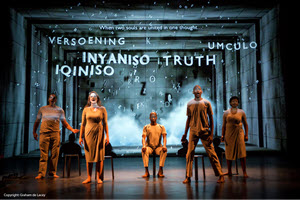
The Journal of Black Opera and Music Theatre is the official journal of the Black Opera Research Network (BORN). We welcome submissions on opera and other forms of music theatre that center Blackness as a subject, methodology, identity construction, and/or critical lens and engage critically with multinational perspectives and identities. Our perspective is global, transnational, and committed to engaging with contested definitions of Blackness. We understand opera and music theatre to be capacious terms and welcome submissions that challenge the putative boundaries of genre.
The editorial team chose the image from Umculo's Lamento production for the first issue of the Journal of Black Opera and Music Theatre because it captures several aspects that are important to us.
We, the editorial team, are as multiracial as the protagonists of this production. And we want contributions from people of all races and ethnicities. This also means that language and finding a language for our thematic content is close to our hearts. As the letters in this image find each other to form words, we want to go through this progress of finding words and an academic language together with other scholars. The word "Umculo" (Xhosa and Zulu) in the image means "art music and reconciliation" and our first issue on (de)coloniality also deals with issues of historical and contemporary confrontation with injustice and societal reactions to it. Find the call for paper here.
We will change the image for each issue. Thanks to the Umculo team for allowing us to use this image from Lamento. It is a Pastiche Opera in seven scenes, by Kobie van Rensburg, based on scenic madrigals by Claudio Monteverdi. It was inspired by the Truth and Reconciliation Commission and its reverberation in present-day South Africa and performed 3-6 November 2016 at the Market Theatre, Johannesburg.

